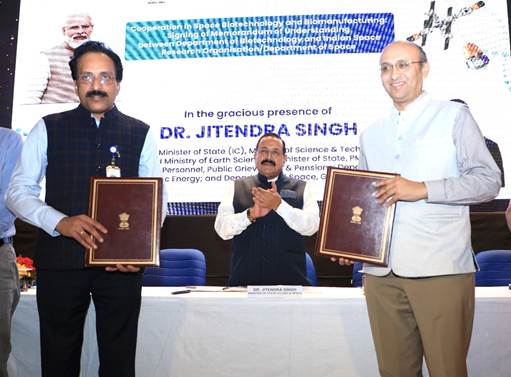New Delhi, October 26, 2024: India will have its own Space Station by 2035, which will be known as “Bharatiya Antriksh Station”.
This was disclosed here today by Union Minister of State (Independent Charge) for Science and Technology, Earth Sciences, Department of Space Dr Jitendra Singh while responding to a query from the media after he announced the signing of a landmark Memorandum of Understanding (MoU) between the Indian Space Research Organisation (ISRO) and the Department of Biotechnology (DBT).

In a significant development, the MoU marks a unique collaboration aimed to integrate biotechnology with space technology, heralding a new era of scientific innovation in India.
Dr Jitendra Singh highlighted the transformative journey of biotechnology, which has traditionally been confined to laboratories, now reaching the vast expanse of space.
He emphasised that this MoU represents a pivotal step towards practical applications of biotechnology, moving beyond theoretical research.
The Minister praised ISRO Chairman S Somnath and Secretary of the Department of Biotechnology Dr Rajesh Gokhale for their efforts in making this collaboration possible.
Dr Singh emphasised on public-private participation, which has been instrumental in the rapid growth of India’s space sector. He credited Prime Minister Narendra Modi for opening up the space sector to private players, leading to a surge in innovation and entrepreneurship. The minister pointed out that the number of space startups has grown significantly, with nearly 300 startups now contributing to the space economy.
He also spoke about the rising prominence of biotechnology, particularly in the wake of the COVID-19 pandemic. He acknowledged the Department of Biotechnology’s role in developing the first-ever DNA vaccine, which brought global recognition to India’s scientific capabilities.
The MoU outlines several key initiatives, including the establishment of a Bharatiya Antariksh Station and the unveiling of the BioE3 (Biotechnology for Economy, Environment and Employment) Policy. This policy aims to foster high-performance biomanufacturing in the country, with a goal of reaching a $300 billion bioeconomy by 2030. The collaboration will focus on areas such as microgravity research, space biotechnology, space biomanufacturing, bioastronautics, and space biology.
This partnership is expected to benefit the national human space programme and spur innovations in human health research, novel pharmaceuticals, regenerative medicine, and bio-based technologies for efficient waste management and recycling. It will also open opportunities for startups in the space and biotechnology sectors to develop commercially attractive technological solutions.
More Stories
Modi condoles the loss of lives due to mishap in Kurnool district of Andhra Pradesh
Prime Minister Narendra Modi today condoled the loss of lives due to a mishap in Kurnool district of Andhra Pradesh.
3,91,289 athletes from 7 districts registered for the Bastar Olympics 2025
The enthusiasm among the people for the Bastar Olympics, which begins on October 25th this year, can be gauged from the fact that so far, 3,91,289 athletes from 7 districts of the Bastar division have registered.
Preparations for Rajyotsav and Prime Minister’s Nava Raipur visit reviewed
Three Chhattisgarh ministers today reviewed the preparations for the Rajyotsav and Prime Minister Narendra Modi’s Nava Raipur visit. They also conducted a thorough review of various arrangements with officials involved in the preparations for the state foundation day and provided necessary guidelines.
Punjab Ministers Meet Chief Minister Sai; Extend Invitation
The Punjab Government today invited Chhattisgarh Chief Minister Vishnu Dev Sai to attend a special event being organized to commemorate the 350th martyrdom anniversary of the 9th Sikh Guru, Shri Guru Tegh Bahadur Ji.
Construction of four new medical colleges worth Rs 1286 crore approved
The Vishnu Dev Sai government today approved tender rates for the construction projects of four new government medical colleges in Chhattisgarh, totaling Rs 1286 crore.
ECI’s two-day CEO conference on nationwide SIR preparedness begins
The Election Commission of India (ECI) today held a meeting with Chief Electoral Officers (CEOs) to review the preparations for the nationwide Special Intensive Revision (SIR).


